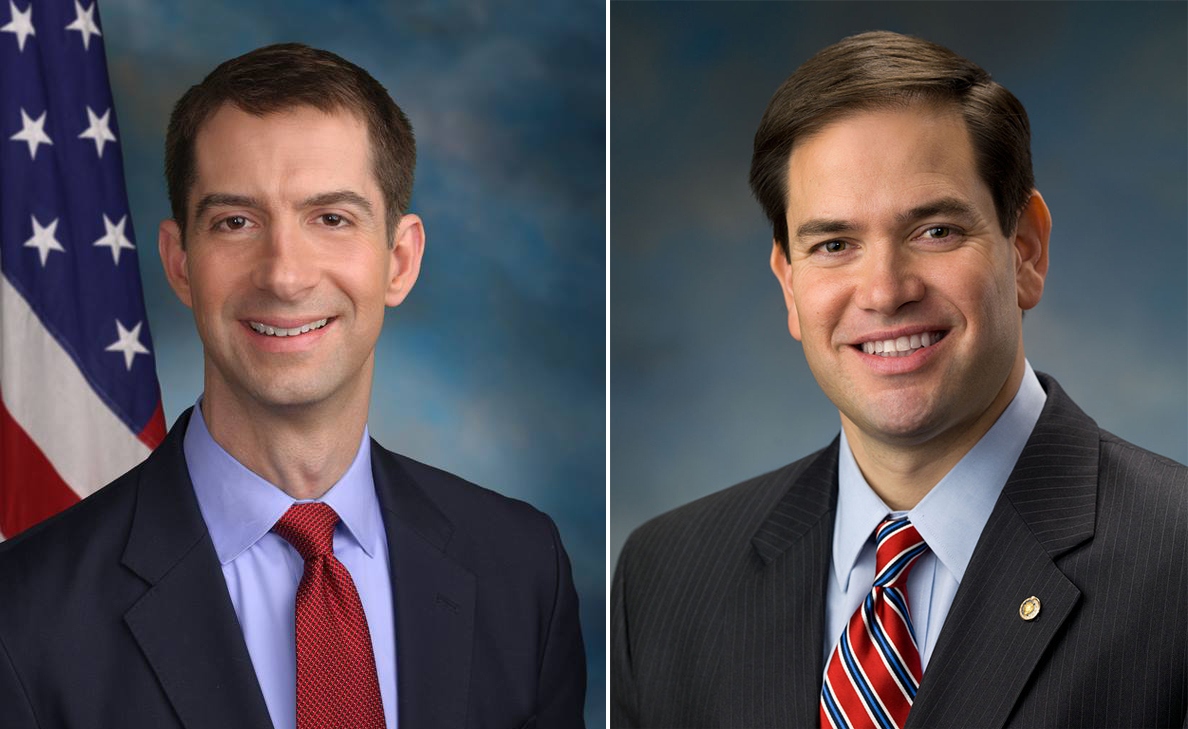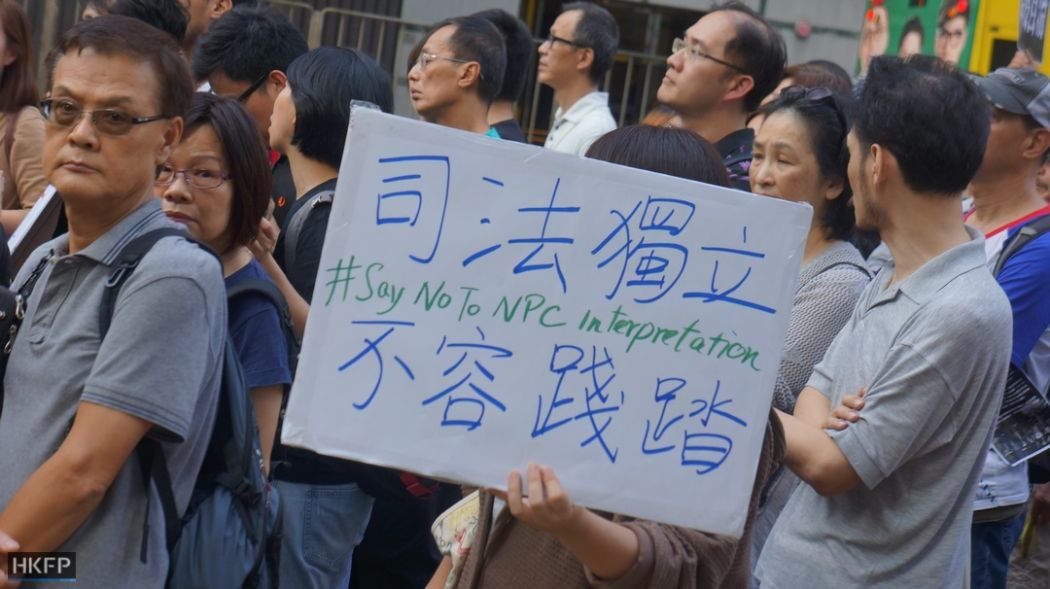US senators Marco Rubio and Tom Cotton have introduced a legislation that “establishes punitive measures against government officials in Hong Kong or mainland China who are responsible for suppressing basic freedoms in Hong Kong.”
The bill, previously tabled, was updated to reflect the latest political developments in Hong Kong and made suggestions such as freezing the assets of people responsible for kidnapping Hong Kong booksellers. It was introduced as student leader Joshua Wong was visiting the United States.
Rubio and Cotton, respectively the co-chair and commissioner of the Congressional-Executive Commission on China (CECC), introduced the Hong Kong Human Rights and Democracy Act, a piece of legislation that they said “would renew the United States’ historical commitment to freedom and democracy in Hong Kong at a time when its autonomy is increasingly under assault.”

The act came after an annual report of the CECC published last month, which said that the US administration and congress should determine whether there is a need to revise the 1992 Hong Kong Policy Act. Last year, a bipartisan group of U.S. legislators, including the CECC’s chairman Chris Smith, also tabled a companion bill at the House of Representatives.
“The United States must lead the world in ensuring that the Chinese government ceases any repressive acts in Hong Kong and abides by its three-decade-old international commitment to respect the autonomy of Hong Kong,” Cotton said in a press release. “This bill would empower the president to hold Beijing accountable and send a strong message to Chinese officials that attempts to undermine liberty in Hong Kong and walk away from their promises will not be without consequences.”
New powers suggested
Under the existing United States-Hong Kong Policy Act of 1992, the US supports democratisation and human rights for Hong Kong, and the country’s policy towards Hong Kong – which is different from its policy towards China – is only justified if Hong Kong is “sufficiently autonomous.”
The proposal requested that the US reaffirm this principle, and said that the Secretary of State should be required to certify that Hong Kong is sufficiently autonomous before enacting any new laws or agreements affording Hong Kong different treatment from the China.
The legislation also requests that the US president identify persons responsible for the surveillance, abduction, detention, or forced confessions of certain booksellers and journalists in Hong Kong and other actions suppressing basic freedoms. It asks the president to freeze their US-based assets and deny them entry into the US.

The act, should it be passed, would also make clear that visa applicants who resided in Hong Kong in 2014 – the year of the pro-democracy Occupy protests – shall not be denied visas on the basis of the applicant’s arrest, detention or other adverse government action taken as a result of their participation in nonviolent protest activities related to Hong Kong’s electoral process.
It would also reinstate the requirement for the Secretary of State to issue a report on conditions in Hong Kong of interest to the United States, including developments related to democratic institutions in Hong Kong, no later than 90 days after enactment and every year through 2023.
Professor Hung Ho-fung, associate professor of Sociology at Johns Hopkins University, told HKFP that if the legislation was passed, “it will have real and immediate effect hurting the interests of some responsible Chinese/Hong Kong officials and helping dissidents in Hong Kong.”
“If passed, it is going to send a signal to China that the US is still very serious about its commitment to helping secure autonomy of Hong Kong and that there will be consequences if Beijing continues to move Hong Kong toward one-country one-system,” he said. “If US ceases to treat Hong Kong and mainland China differently in its laws, China will lose a lot of advantages and conveniences of Hong Kong being its offshore market.”
‘Unprecedented intervention’
Rubio said Beijing has consistently undermined the “One Country, Two Systems” principle and infringed on the democratic freedoms of Hong Kong in recent years.
“This was on stark display over the last year with the abduction of the Hong Kong booksellers, the required loyalty oaths in the lead-up to the September LegCo elections, and last week with Beijing’s unprecedented intervention in Hong Kong’s legal system to block two democratically elected politicians from assuming office,” he said.
“China’s assault on democratic institutions and human rights is of central importance to the people of Hong Kong and to its status as a free market, economic powerhouse and hub for international trade and investment,” he added. “It is critical in the days ahead that the democratic aspirations of the people of Hong Kong be a vital U.S. interest and foreign policy priority.”

Before the proposal was made public, Rubio met with Hong Kong student protest leader Joshua Wong in Washington DC. Rubio said in the release of the proposed act that “Joshua Wong is an impressive and thoughtful young man who, along with his fellow activists, represents the future of Hong Kong.”
Wong said Rubio spoke of his identity as a Cuban descendant and encouraged Hong Kong people to not back down in the face of China’s communist regime.
Meeting with Leader @NancyPelosi to discuss my detention in Bangkok last month and Hong Kongers’ declining freedom of entry pic.twitter.com/KYAo581S4z
— Joshua Wong 黃之鋒 😷 (@joshuawongcf) November 17, 2016
“What impressed me the most was what he told me when I was leaving: Time is on your side,” Wong said.
Professor Hung said it is difficult to tell when the bill would be passed, but “given Washington’s increasing disillusion, disappointment and impatience with China on trade, human rights, geopolitical and many other issues in recent years, and if the new administration is going to be serious about getting tough on China over trade and other issues, this bill will have a fair chance to pass.”
Met with Joshua Wong today, a true champion for democracy in China. pic.twitter.com/qlAz6pJHzT
— Fmr. Rep. Tim Walz (@RepTimWalz) November 16, 2016
Meanwhile, Wong urged president-elect Donald Trump on Wednesday to support human rights in Hong Kong, reported the Associated Press.
“Being a businessman, I hope Donald Trump could know the dynamics in Hong Kong and know that to maintain the business sector benefits in Hong Kong, it’s necessary to fully support human rights in Hong Kong to maintain the judicial independence and the rule of law,” Wong said.
